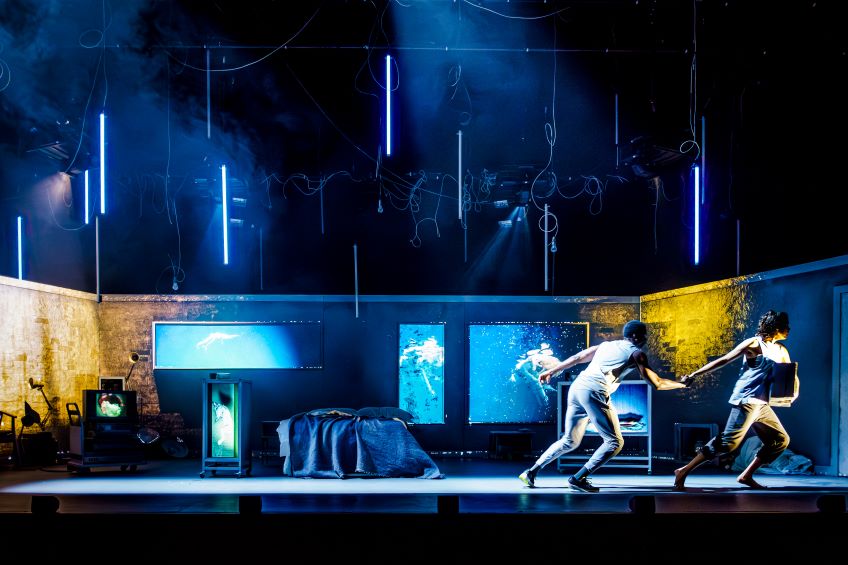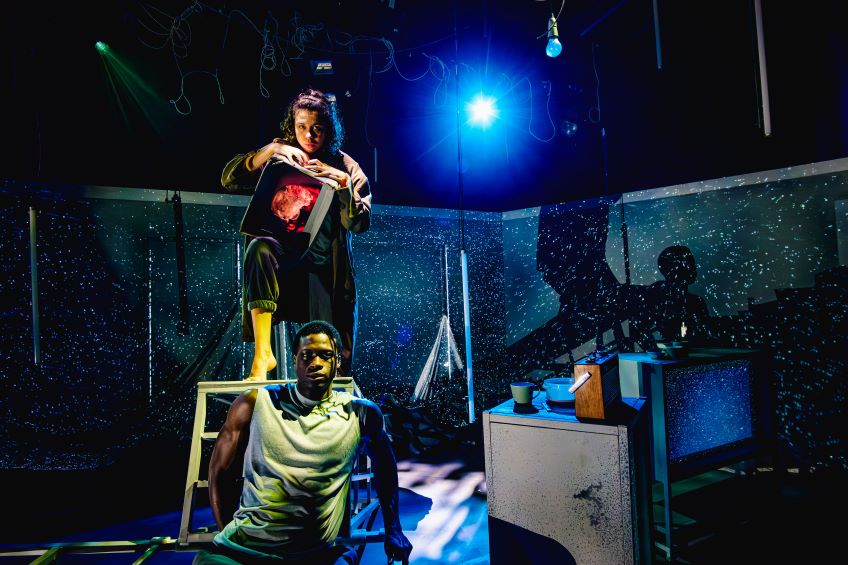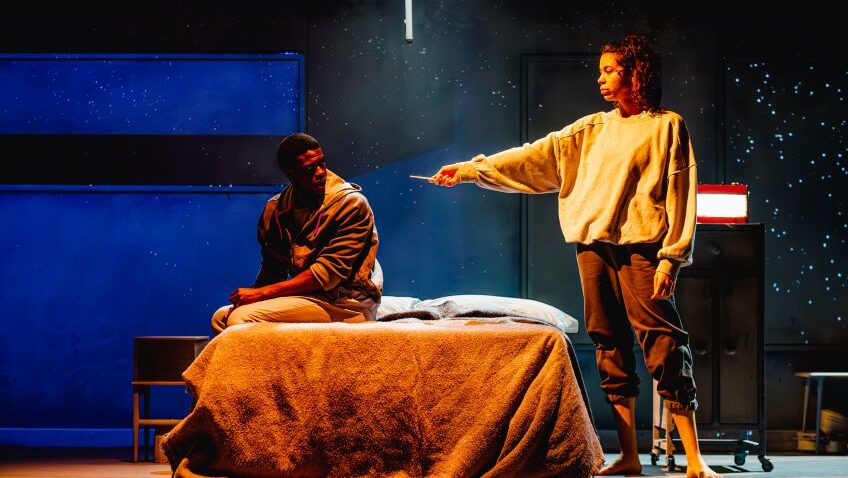Inspired by Mary Shelley’s compelling Gothic horror story, Frankenstein is a touring co-production of Leeds Playhouse and Imitating the Dog. In fact, it’s two plays in one, two stories with different characters progressing in parallel as scenes click back-and-forth, often very rapidly. One story is Shelley’s, the other that of a modern-day couple. Switching characters in split seconds, Georgia-Mae Myers and Nedum Okonyia play all roles, performing throughout with emotional energy and passion as well as physical strength and agility. Snippets of textual narration fly through the ether, too, courtesy of Olwen May.
Mary Shelley was but twenty when Frankenstein was published in 1818 (anonymously, of course, because she was female). By that age she’d already led a turbulent life herself. Her mother, philosopher and feminist Mary Wollstonecraft died when she was just days old and she didn’t like her step-mother. Her philosopher father brought her up as an independent freethinker, and… at 16, she fell in love and ran off to Europe with married bad-boy poet Percy Bysse Shelley (and her half-sister Clare), coming home pregnant, losing the baby and marrying Percy shortly after his wife committed suicide (as did her other half-sister, Fanny). As their best friend was charismatic poet, Lord Byron, mad, bad and dangerous-to-know, wider travel, drugs and free-love love-ins were all on the cards, too. It was when the three were fooling about inventing horror stories that Frankenstein was born.

In Mary’s world, ambitious explorers and scientists were pushing boundaries all around her so it’s not surprising she has one of each in her tale. It’s Arctic explorer Robert Walton who first encounters obsessed scientist Frankenstein who tells how he assembled body parts and used the wonder of electricity to zap a huge creature into life. Mary’s book tells of murder and mayhem but centres largely around complex philosophical and psychological issues regarding the physical and emotional needs, desires and reactions of any human (or created being).
Weighty questions arise: how far will people go to pursue their own selfish obsessions and ambitions? how far are they responsible for the well-being of their fellow creatures? are human flaws and the capacity for good innate, or shaped more by events and experiences? How do fears, anxieties and prejudices affect behaviour? In short – questions on life, death, morality, conscience and the human soul. Frankenstein’s created being, like any human, has both the propensity to be brutal, aggressive and monstrous and the potential to be kind, altruistic and contented. What pushes any being one way rather than the other? Can rejection, exclusion, loneliness, negligence, brutalisation, suffering, desperation and misery make us wicked? Does being loved and cherished stop us being brutal and encourage us to help others?
This production is particularly BIG when it comes to loud, bang-flash-wallop-crash, and choppy, in-your-face overloads of busy, dizzy audio and visual technology, but it’s strongly determined, too, to convey the philosophical and psychological concerns voiced by Shelley.

In the present day, Myers, in grey and white casual garb, is an unexpectedly pregnant woman, anxious and neurotic about climate change and an uncertain future, unsure she’ll even love her child if it’s born; then, in a blink she’s Arctic explorer, Robert Walton, his ship stuck in the ice when he encounters Frankenstein, half-dead in pursuit of a giant being. In another blink, she dons a dark coat and becomes that very being. Meanwhile her modern-day, confused, anxious partner, also in grey casual, is alternately Victor Frankenstein.
The couple’s stormy relationship is all argument, accusation and confrontation but they do have their tender moments, often enacted (for some reason) via supple, graceful, acrobatic enfoldings and choreographed rollings and intertwinings. As they look down from the window of their flat they follow the life and death of a lonely, forsaken, homeless man, abused and beaten; abuse has made him crazy, aggressive and unpredictable. Ditto, of course, Frankenstein’s creation. Just as Victor realises that the being he gave life too needed to be loved and cherished to become a loving being, the pregnant woman knows her baby must be loved when it arrives to give it a chance in life.
A simple, sparse set with long wall of battle-ship grey, plain cupboards, chairs and bed is the couple’s bedroom and serves, too, as the stranded Arctic ship. Rarely, though, is the set bland and still. A gentler pathos does come with the pre-show and interval music, and the attractive light-sabre tubes of changing colour that are suspended everywhere above (and serving at times as tangible props) are generally silent. Much of the time, though, hyper-busy sounds and visuals whack the audience relentlessly, walls and screens bombarding us with lightning flashes and ever-moving, ever-changing snowstorms of crackling, fizzling, sizzling electrical interference, as thunder throbs and crashes, a lit-up radio broadcasts the shipping forecast in a perpetual under-mumble, and operatic German strains pour forth, sung by Beth Moxon. Sometimes electrical snow is replaced by fire, birds or swirls of bubbling water with frogs, foetus or a beating heart, which rings the changes at least. But might there be overkill, perhaps, on the electrical chaos front?
There’s much to be admired in this fascinating production in the fine acting and the stance of the ambitious stories, but might the disjointed fragmentation of the tales and the overload of visual and audio output prove just too horrific for some?
Eileen Caiger Gray




